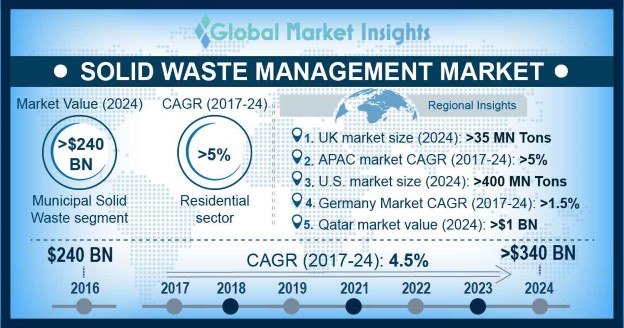Municipal solid waste management market to amass remarkable returns over 2017-2024, enforcement of favorable governmental programs to drive the industry landscape
Publisher : Fractovia | Published Date : 2017-12-04Request Sample
Naxos’ 6th annual conference on sustainable solid waste management is evidence to the fact that solid waste management market has become a subject of contention since for a while now. Considering the rapidly increasing waste volumes across emerging nations, it is indisputable that solid waste management industry is certain to observe tremendous expansion in terms of revenue over the coming years. Elaborating further, the Naxos 2018 conference that is scheduled to be held between 13- 16th June 2018, is reported to address the critical issues related to sustainable solid waste management, emphasizing on the safe practices and modern solid waste technologies. For the record, the move comes on the heels of providing adequate knowledge among the citizens and scientists regarding the latest advancements in the field of MSW (municipal solid waste) management. Such moves, overtly, are deemed to open up lucrative growth opportunities for solid waste management market over the ensuing years.
U.S. Solid Waste Management Market By Disposal, 2016 & 2024 (Million Tons)

In fact, if experts’ opinion is to be believed, the conference would provide a lucrative opportunity of amalgamating government departments, private institutions, municipalities, scientists & professionals, and research & education institutions in a single forum, where exchange of ideas regarding the recent developments in waste management techniques would undoubtedly proliferate the regional solid waste management market in the region. One of the fundamental rationales behind the accelerated growth of solid waste management industry is large-scale urbanization across developed economies that have led to humongous accumulation of municipal solid waste (MSW). A recent statistic put forth by the UN DESA (United Nations Department of Economic and Social Affairs), worldwide, the urban population is expected to account for almost 66% of the total population by 2050. Thus, it is imperative for potential investors to keep in mind that municipal solid waste management industry has a lucrative growth prospect ahead. Estimates claim that this particular business sphere would exceed a valuation of USD 240 billion by 2024.
With macro-economic development, the requirement of efficient solid waste management has, of late, become much more crucial, driven by the increased consumption of resources, especially plastics across emerging nation. In light of this scenario, it is undeniable that solid waste management market demand would surely boost over the coming years. Say, for instance, statistics depict, in Philippine, amount of plastic waste produced annually is almost 2.7 million metric tons, with Manila alone accounting for nearly 600,000 metric tons of hazardous plastic. While the country is claimed to possess high waste collection rate overall, 31% of the uncollected plastics is lost in marine ecosystem and for collected plastics, the ocean leakage rate is 17%, cite reliable sources. These statistics draw quite a picture of the immense potential opportunities of solid waste management market in the coming years.
If there is one iota of detail that is obscurely known regarding solid waste management industry, it is the fact that the business space is highly regulatory driven. Perhaps, marred by the fact that despite significant efforts being already taken, a major chunk of the municipalities in emerging nations still fail to manage the increasing volume of waste that is produced in their cities. Nonetheless, what remains to be taken into consideration is that solid waste management industry is remnant of a stringent regulatory framework. Speaking along the similar lines, the RCRA (The Resource Conservation and Recovery Act) enforced by U.S. EPA is one such regulatory implementation that has left a pronounced impact on the overall solid waste management industry dynamics. Elaborating further on the Act, RCRA is a public law that mainly deals with proper management of all types of solid waste. In tandem, some of the other mandating rollouts of RCRA program include comprehensive underground storage tank management, increased enforcement authority for EPA, and standardization of hazardous waste management. For solid waste management market players, to comply with these regulatory standards is thus an absolute necessity.
While these mandatory regulations undoubtedly have brought an increased awareness regarding the importance and the urgency of protecting the ecosystem, the cost associated with the treatment of these wastes is often huge for the already overstretched municipal budgets. In a bid to respond to this monetary challenge, a plethora of initiatives have been undertaken by governments of developing & developed nations, which by extension has phenomenally proliferated solid waste management market. For instance, the Indonesian Government, under the National Industrial Policy (Regulation No 28/2008) aims to provide feed-in tariffs, grants, and soft loans for the country to purchase advanced waste treatment equipment. All in all, the domination of regulatory framework along with these governing bodies’ mandatory set of guidelines are expected to augment solid waste management industry size, which is forecast to record a massive valuation of USD 340 billion by 2024.